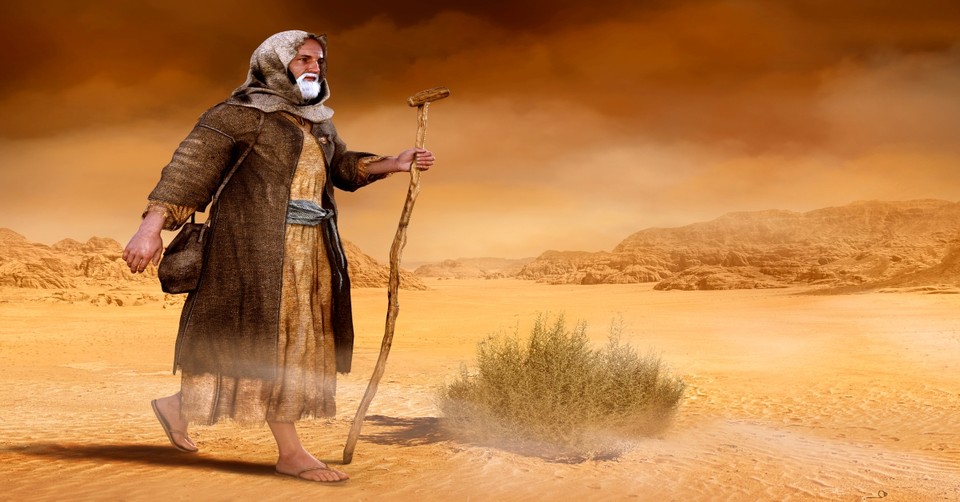What Can We Learn from Abraham’s Father Terah?

If you have ever moved from one country to another, you know how uprooting it can be. You recognize how difficult the journey can become. Different customs, cultures, and languages unsettle even the most stable personalities. Within Scripture, significant moves changed the course of the history of entire peoples. One of those involved a man named Terah and his family. We remember Terah as the father of Abram, who received God’s covenant promises regarding Jesus Christ.
Although he is mentioned in just a few verses, the magnitude of Terah’s spot in history can’t be overlooked. Through Terah’s line, his son Abram became the father of the nation of Israel. Luke records Terah’s and Abraham’s names in the genealogy of Jesus.
“…the son of Jacob, the son of Isaac, the son of Abraham, the son of Terah, the son of Nahor…” (Luke 3:34 ESV).
Where Did Terah Come From?
In Genesis 11, we read that Terah came from Ur of the Chaldeans. Ur was a large and prosperous city-state in Mesopotamia (present-day southern Iraq). The Chaldeans, no longer in existence, predate Israel.
“Now these are the generations of Terah. Terah fathered Abram, Nahor, and Haran; and Haran fathered Lot. Haran died in the presence of his father Terah in the land of his kindred, in Ur of the Chaldeans” (Genesis 11:27-18 ESV).
The name “Ur” comes from “light” or “fire,” likely descriptive of its idolatrous fire-worship common in the land. The city also gave homage to the moon god “Sin.” Terah, along with other Israelite forefathers, embraced pagan practices. God, in His merciful choosing, apparently spoke to Abram even before Abram knew God.
Later, in Joshua’s farewell address to the people of Israel, he reviewed their history. His speech confirmed where they’d come from, both logistically and spiritually.
“Thus says the Lord, the God of Israel, ‘Long ago, your fathers lived beyond the Euphrates, Terah, the father of Abraham and of Nahor; and they served other gods” (Joshua 24:2 ESV).
Terah’s father, Nahor, came from the line of Noah’s son Shem. More than 220 years passed between Noah’s flood and the birth of Terah. The faith of Noah did not multiply with the decades. The tower of Babel scattered and collected people into groups, regions, and languages. Once again, humankind strayed into idolatry.
Why Did Terah Move to Haran?
We are not told in Genesis why Terah moved his family away from Ur to Haran. However, in Acts 7:2-4, Stephen gives a powerful account of God’s movement throughout Israel’s history. He outlines to the council and high priest facts, leading to his proclamation that Jesus was Messiah. In his message, he reveals that God spoke to Abraham even before he lived in Haran.
“And he said, ‘Brethren and fathers, listen: The God of glory appeared to our father Abraham when he was in Mesopotamia, before he dwelt in Haran, and said to him, ‘Get out of your country and from your relatives, and come to a land that I will show you.’ Then he came out of the land of the Chaldeans and dwelt in Haran. And from there, when his father was dead, He moved him to this land in which you now dwell” (Acts 7:2-4 NKJV).
Haran, meaning “road” or “crossroads,” served as a crossroads trading town between Arabia and Syria in northern Mesopotamia. Abram would have traveled along the Euphrates to get to Canaan rather than crossing the desert with his large group of people and animals. Terah’s son, Haran (not to be confused with the city), died in Ur. Haran’s son Lot, Terah’s grandson and Abraham’s nephew, became a well-known Biblical figure in later chapters. Terah led the momentous move south-southeast from Ur.
“Terah took Abram his son and Lot the son of Haran, his grandson, and Sarai his daughter-in-law, his son Abram’s wife, and they went forth together from Ur of the Chaldeans to go into the land of Canaan, but when they came to Haran, they settled there” (Genesis 11:31 ESV).
They stopped before they got to Canaan.
Was Terah Alive When Abraham Left for Canaan?
There is some confusion about whether or not Terah still lived when Abraham left Haran for Canaan, although Stephen’s discourse clearly puts the final move to Canaan after Terah died.
“And from there, when his father was dead, He moved him to this land in which you now dwell” (Acts 7:4 NKJV).
Some scholars believe Terah died 60 years after Abraham left the city of Haran and journeyed to Canaan. If we assume the names of Terah’s children are in chronological order in Genesis 11:26, there seems to be a discrepancy. Genesis 11:26 says, “Now Terah lived seventy years, and begot Abram, Nahor, and Haran.”
Terah began having sons at the age of 70. The years do not seem to align with Stephen’s message. However, no apparent inconsistency exists if the sons are not listed in birth order but rather by prominence. Terah’s age then would have been 130 at Abram’s birth, which agrees with the Bible’s 205 years of Terah’s life.
“And the days of Terah were two hundred and five years: and Terah died in Haran” (Gen. 11:31-32 KJV).
Stephen’s statement, given under the Holy Spirit’s direction, confirms that Abraham remained in Haran until Terah’s death. Following God’s command, Abraham resumed his journey to Canaan at 75 years old, after Terah’s death.
Why Did God Tell Abraham to Leave Terah’s Household?
Although we’d like to assume Terah feared God, there is nothing to support that in Scripture. God’s command removed Abram from the influences of Terah’s household.
The name Terah means “delay,” “wanderer,” “breather,” while the name Haran means “parched, or barren.” Abraham means “exalted father.”
Terah undoubtedly knew his journey should end in Canaan. Older, perhaps tired, Terah delayed continuing the journey. Five hundred miles remained. Perhaps good reasons prevented him from going farther. We don’t know why he settled in Haran. We know that, unfortunately, Terah did not embrace God during the delay but worshipped pagan gods (Joshua 24:2 ESV). Terah’s paganism eventually divided his household from his son Abraham’s.
God spoke to Abram in what we know as the Abrahamic covenant through which God promised to make from Abraham a great nation. The original Hebrew verb tense in the following verse, “Now the Lord had said,” confirms that God first called Abram before he left Ur.
“Now the Lord had said unto Abram, Get thee out of thy country, and from thy kindred, and from thy father’s house, unto a land that I will shew thee: And I will make of thee a great nation, and I will bless thee, and make thy name great; and thou shalt be a blessing: And I will bless them that bless thee, and curse him that curseth thee: and in thee shall all families of the earth be blessed” (Genesis 12:1-3 KJV).
Abraham and his family needed to separate themselves from beliefs contrary to the One True God. God wanted to be their only God, Master, and Teacher. He desired them to be set apart, yet God’s plan would extend to every nation through them.
Abraham obeyed. He packed up and moved again. He put behind him financial security, physical safety, and ease. He left for a land unfamiliar, but with God in the lead.
What Can We Learn from Terah?
Although we only have a few passages that deal with Terah, we learn some important lessons from them.
1. There is only One God, and we must worship Him alone. We, too, must decide whom we will serve.
2 . When we delay following what we know to be right, it opens the door to putting something else higher than God in our lives and settling for less than God desires. This brings a “parched and barren” spiritual life as Terah experienced in Haran.
3. God makes good on His promises. His faithfulness extends beyond our comfort zone and past what we can see. Terah did not look far enough ahead.
4. When God moved his people in the Bible, He moved them with purpose. When God leads, we must follow.
5. Be intentional in passing the faith to the next generation. Before Terah, Noah found favor in the eyes of the Lord, but knowledge of God faded as generations passed.
Terah’s legacy runs through the Old and New Testaments. His name, mentioned in the line of the Messiah, reminds us of God’s unmerited mercy. Jesus fulfills God’s promise to bless all the families of the earth. Through Christ, we become Abraham’s spiritual children and heirs of a new covenant.
The lessons of Terah move us to complete our journey well, to worship Jesus alone, and follow Him wherever He leads. Terah’s journeying reminds us that there is a better place ahead.
Photo Credit: Getty Images/ratpack223

Her love for pasta and all things Italian stems from years of ministry abroad. She’d love to tell you about it over a steaming cup of cappuccino. Connect with Sylvia on her blog, When the House is Quiet, her Facebook page, or Twitter.
This article is part of our People from the Bible Series featuring the most well-known historical names and figures from Scripture. We have compiled these articles to help you study those whom God chose to set before us as examples in His Word. May their lives and walks with God strengthen your faith and encourage your soul.
4 Things You May Not Know About Abraham in the Bible
20 Facts You May Not Know About Moses from the Bible
Who Was Mary Magdalene in the Bible?
Who Were the 12 Disciples of Jesus?
Who Was Isaiah & Why Was He Important?
Originally published July 18, 2022.







